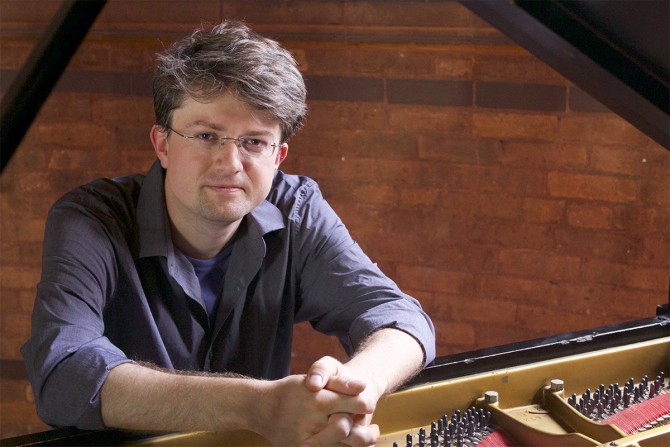
Buster Keaton, left, has too many marriage prospects in “Seven Chances,” showing Feb. 23 in the Ithakid Film Festival at Cornell Cinema with Philip Carli on piano.
Things to Do, Feb. 22-March 1, 2019
By Daniel Aloi
Marriage madness
Buster Keaton learns he stands to inherit a fortune if he's married by sundown, proposes to every person in a skirt and winds up causing a 500-bride stampede in “Seven Chances,” showing at 2 p.m. Feb. 23 in Willard Straight Theatre. The screening, featuring live piano accompaniment by Philip Carli, is part of the Ithakid Film Festival.
Advance tickets are $7 for adults, $5 for kids age 12 and under, available at CornellCinemaTickets.com for the Saturday matinee screening. (Ithaca City School District teachers enjoy a buy-one-get-one Cornell Cinema ticket deal this week during Winter Recess, available at the door only for this screening.)
Cornell Cinema also features a Middle Eastern Cinema series this semester, in conjunction with a course taught by Deborah Starr, associate professor of Near Eastern studies. The series begins with “The Wild Pear Tree,” Feb. 27 and March 3 at 6:45 p.m.; and includes “In Between (Bar Bahar),” Feb. 28 at 6:45 p.m.; “Working Woman,” March 7 and 10; and “Capernaum,” April 25-26. Films are cosponsored with Near Eastern studies and the Jewish Studies Program.
On creativity and real intelligence
Robert Sternberg presents “What Schools Fail to Recognize: Creativity, Common Sense, Critical Thinking, and Wisdom Trump Knowledge and IQ,” in a Chats in the Stacks book talk, Feb. 27 at 4 p.m. in Mann Library’s Stern Seminar Room. The talk is free and open to the public.
While IQ scores rose 30 points on average during the 20th century, in many respects the world is in a more perilous state now than in 1900. We have autocrats, economic inequality, pollution, climate change and antibiotic resistance. How did this come to be? Sternberg, a professor of human development, says one reason is schools are failing our children and society by largely teaching the wrong things. Children need to learn to be creative, to develop common sense, to think critically and to act with wisdom, to seek a common good.
Applying research from his new edited volumes “The Nature of Human Creativity” (with James C. Kaufman) and “The Nature of Human Intelligence,” Sternberg will discuss how intelligence and creativity, as well as wisdom, broadly defined, are crucial in a college education, and how they can be more effectively measured, investigated and developed.
Understanding copyright
Cornell’s Copyright Information Center marks Fair Use Week with back-to-back sessions on copyright basics and fair use, Feb. 28 in 160 Mann Library. The courses are for all students, faculty and staff who create or use copyrighted materials in research, coursework, writing, course design, etc. Refreshments will be served.
Copyright Basics, 9 to 10:15 a.m., includes an introduction to the structure of U.S. copyright law and the exclusive rights copyright owners have over their work.
Copyright and Fair Use, 10:30 a.m. to noon, covers four factors of fair use (a legal exemption to the exclusive rights of copyright holders) and their application to writing and scholarship.
Local and Latinidad
A family-friendly exploration of what it means to be Latino or Latina in a snowy upstate town is coming to the Schwartz Center for the Performing Arts. Showtimes for “Habla/Speak” are Feb. 28 at 7:30 p.m., March 1 at 5 p.m., and March 2 at 2 and 7:30 p.m. Tickets are $5.
The show features performers telling stories from their lives and musings on what Latinidad means to them. The storytellers will share music, dance and poetry – and tamales as part of a family celebration of a young girl’s quinceañera.
Collaborators include children, young adults and elders ages 5 to 65-plus from the Ithaca community, and student co-creators from the Teatrotaller ensemble at Cornell and Teatro at Ithaca College. The performance has bilingual elements and is produced by Debra Castillo and Annette Levine in collaboration with the Latina/o Studies Program and IC Teatro.
Digital Ag solutions
Students from all colleges and majors are invited to participate in Cornell’s inaugural Digital Agriculture Hackathon in the Schurman Hall atrium. The 36-hour event begins March 1 at 5 p.m. and ends March 3 at 2:30 p.m.
The hackathon is an opportunity to explore what technology can do to address challenges in food and agriculture, and take ideas from concept to reality. A schedule and a full list of challenges and judging criteria are listed at the hackathon site.
The weekend features networking with companies creating the agritech industry, $8,000 in cash prizes and conversations with mentors, senior leaders and faculty from Cornell Engineering, the College of Agriculture and Life Sciences, Computing and Information Science and the College of Veterinary Medicine. Hosts also include Cornell AgriTech, Cornell Cooperative Extension, Entrepreneurship at Cornell and the Cornell Institute for Food Systems.
The Cornell Initiative for Digital Agriculture connects top researchers with multidisciplinary practitioners to address global food system challenges, and develops and applies digital innovations designed to improve the sustainability, profitability, resiliency and efficiency of the world’s food systems.
Song cycle for Jim Henson
Bass-baritone David Salsbery Fry and pianist Ryan MacEvoy McCullough will give a recital March 1 at 8 p.m. in Barnes Hall Auditorium, featuring a brand new cycle of seven songs, “Things That Woof and Things That Roar,” set to poetry by Dennis Lee.
The project brought together six composers – all Tanglewood fellows at the same time as McCullough and Fry – to write a set of songs in honor of the late Jim Henson’s 80th birthday in 2016. Lee was Henson’s longtime collaborator and the lyricist on songs for “Fraggle Rock.” The composers are Ruby Fulton, Osnat Netzer, Nicholas Vines, Lembit Beecher, Shawn Allison, and Eric Nathan, D.M.A. ’12.
The concert program also features Messiaen’s song cycle “Chants de Terre et de Ciel (Songs of Earth and Heaven),” performed by McCullough and soprano Lucy Fitz Gibbon.
McCullough also is the piano soloist with the Cornell Wind Symphony on the world premiere of Barry Sharp’s “Familiar Landscapes,” March 2 at 3 p.m. in Bailey Hall.
The concert program includes Rimsky-Korsakov’s “Capriccio Espagnol”; Mozart’s Serenade No. 11; Frank Ticheli’s “Silver Lining” flute concerto, featuring Juliana Pepinsky; and the Ithaca High School Wind Ensemble on Persichetti’s Divertimento for Band, Grainger’s “Spoon River” and other selections.
Both concerts are free and open to the public.
Media Contact
Get Cornell news delivered right to your inbox.
Subscribe

